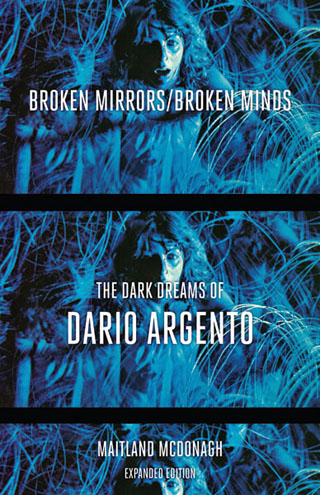“Some heavy hitters out this week,” announces C. Max Magee, opening the weekly list of new book releases at The Millions. And there are: Ian McEwan, Alice Munro, Roberto Bolaño… none, though, directly related to cinema this particular Tuesday. Which is fine, as there are more than enough newish other titles to catch up with.
Let’s begin by turning to probably the best publication to have launched this year, the Los Angeles Review of Books, where Phillip Maciak writes about two film critics who seem to have more in common that you might first think: J. Hoberman and Siegfried Kracauer, who, “in a 1948 essay collected for the first time in this year’s invaluable anthology Siegfried Kracauer’s American Writings, postulated that ‘Films mirror our reality.’ Over the course of their careers, both critics have sought to make good on this notion. Kracauer was among those who first argued that film could not only be the motor force of social change, as the great Russian director Sergei Eisenstein had claimed, but that it could reflect the psychology of the nation that produced it; for him, popular cinema and the desires of the masses were in a constant feedback loop. Hoberman’s column for The Village Voice, in turn, was a weekly workshop in this mode of criticism, and his books over the past decade (especially The Dream Life and An Army of Phantoms) have produced a stunningly clear image of the nexus of American film and culture during the Cold War. Now, with Film After Film, a collection of writings from the Bush era, Hoberman has attempted something approaching the ambition and daring of From Caligari to Hitler. Turning his gaze to the first decade of the twenty-first century, he has dutifully reaffirmed Kracauer’s dictum.”
Also in the LARB, Tom Benedek writes: “Real or accused dead Commies of Beverly Hills must be rolling over in their collective grave as, under the muddy banner of memoir, I Am Spartacus!: Making a Film, Breaking the Blacklist by Kirk Douglas paints a fictional and self-aggrandizing presentation of his actions during the making of that celebrated movie.”
Reviewing another celebrity memoir for the Observer, Arnold Schwarzenegger’s Total Recall, Peter Conrad writes: “He is the spirit of the age made flesh, and his careers as athlete, actor and politician have dramatized its most disturbing paradoxes—the showdown between technology and human nature, the reduction of art to self-marketing, the transformation of government into a branch of showbiz. His surname, translated, means ‘black corner’: he is the dead end at which the evolution of our species and the development of our society have abruptly arrived.”
A new issue of Bright Lights Film Journal went up last week, and we’ll take a closer look at it a bit later, but for now that Gordon Thomas reviews Andrew A. Erish‘s Col. William N. Selig: The Man Who Invented Hollywood: “Claiming Selig as the inventor of Hollywood is a sly nod to reader expectations: the movie industry might well have originated in some sort of big bang, but perhaps, like the creationists needing a creator, it’s only natural that we should want the American film machine to have an inventor. Whether we can call the result—Hollywood—an intelligent design is another discussion, but Erish’s monograph makes a solid case for Selig not just setting up Hollywood in LA, but also for the Colonel being the mastermind behind the unstoppable entertainment juggernaut that is the American film industry.”
And, reviewing Maitland McDonagh‘s Broken Mirrors/Broken Minds: The Dark Dreams of Dario Argento, Erich Kuersten “can’t help but wonder if some of the really deep stuff got lost during the conversion from master’s thesis to mainstream publication, lending it a weird feint-and-jab approach, suggesting great depths before scuttling back to the high ground.” Still: “McDonagh also provides a welcome perspective as one who has frequented both the grindhouses of 42nd Steet remembering seeing a disreputable film at Cine 42—’a shoe box of a grind house so dirty, claustrophobic, and relentlessly seamy that I remember it more vividly than the movie’ (viii)—and Columbia’s master’s program in film history/theory criticism.”
Pointing the community gathered round his site to his excellent review of Kino’s new set Fritz Lang: The Early Works for the New York Times, Dave Kehr adds that “Bernard Eisenschitz’s Fritz Lang au travail is now the new benchmark—a luxuriously oversized volume filled with scrupulously researched accounts of the films and Lang‘s life (no wild accusations of murder here), illustrated with magnificent stills and production sketches. Cahiers du cinema published it last year in conjunction with a Lang retrospective at the Cinematheque Francaise, which means that an English-language edition may come out some day through Phaidon.”
Indiewire introduces an excerpt from a book coming out today: “Alexander Payne: His Journey in Film, a compilation of author-journalist Leo Adam Biga‘s decade-and-a-half of reporting on the director and his work, is a comprehensive look at one of cinema’s most important figures. Biga’s stories about Payne have appeared in various publications including The Reader, which recently ran his cover story on Payne’s latest homespun project, Nebraska.”
Diarmuid Hester, an editor at One+One Filmmakers Journal, finds Geoff Dyer‘s Zona to be a “ceaseless (and, to my mind, unforgivable) domestication of Stalker, a tremendously strange and occasionally miraculous piece of narrative cinema, by the submersion of its every detail into the mire of indulgent, middle-aged memory and bourgeois education.”
So let’s come full circle and return to J. Hoberman. We find him at Artinfo, arguing that Bruce Conner “was one of the true geniuses of the American Century. But, aside from a handsome if unwieldy catalogue that the Walker Art Center published in 2000, Looking for Bruce Conner, the recent MIT October book by Binghamton University art history professor Kevin Hatch, is pretty much the first book to really make that case.”
For news and tips throughout the day every day, follow @KeyframeDaily on Twitter and/or the RSS feed. Get Keyframe Daily in your inbox by signing in at fandor.com/daily.





